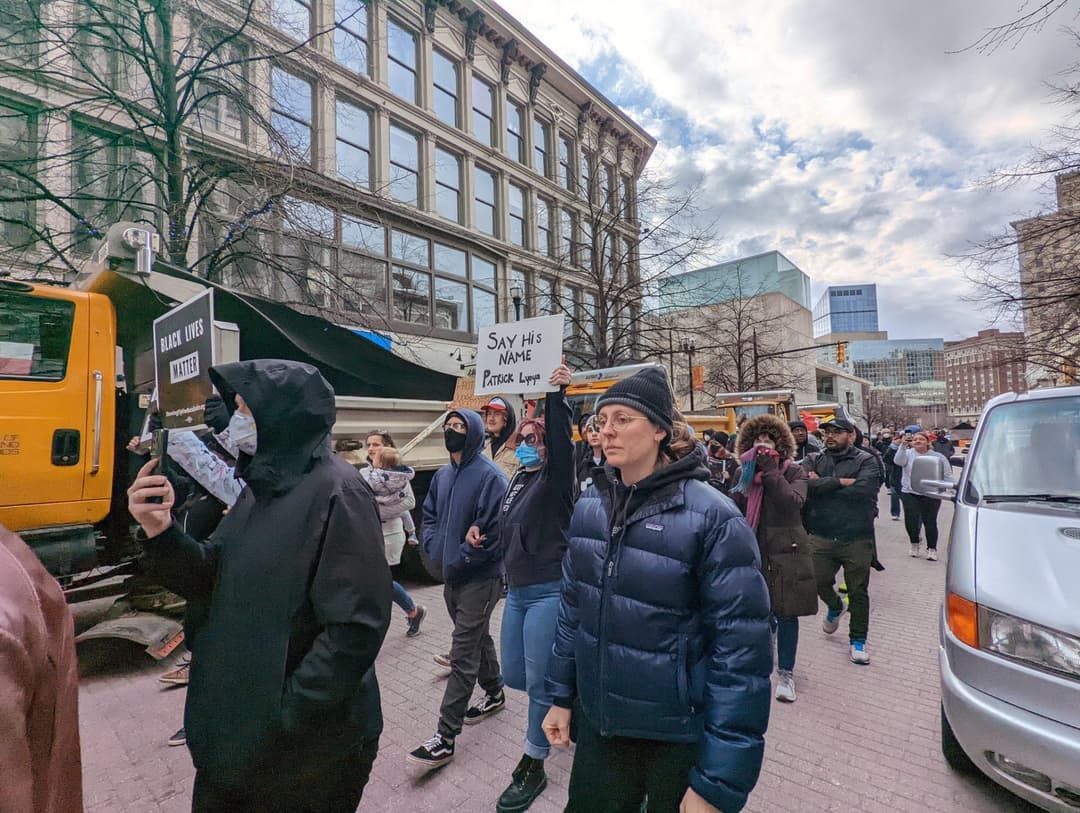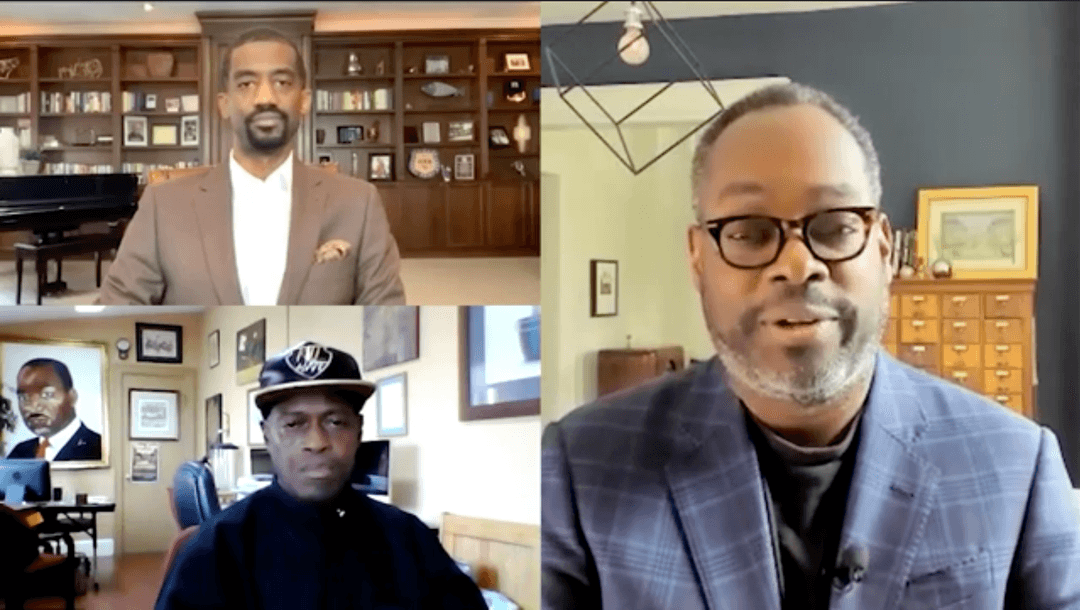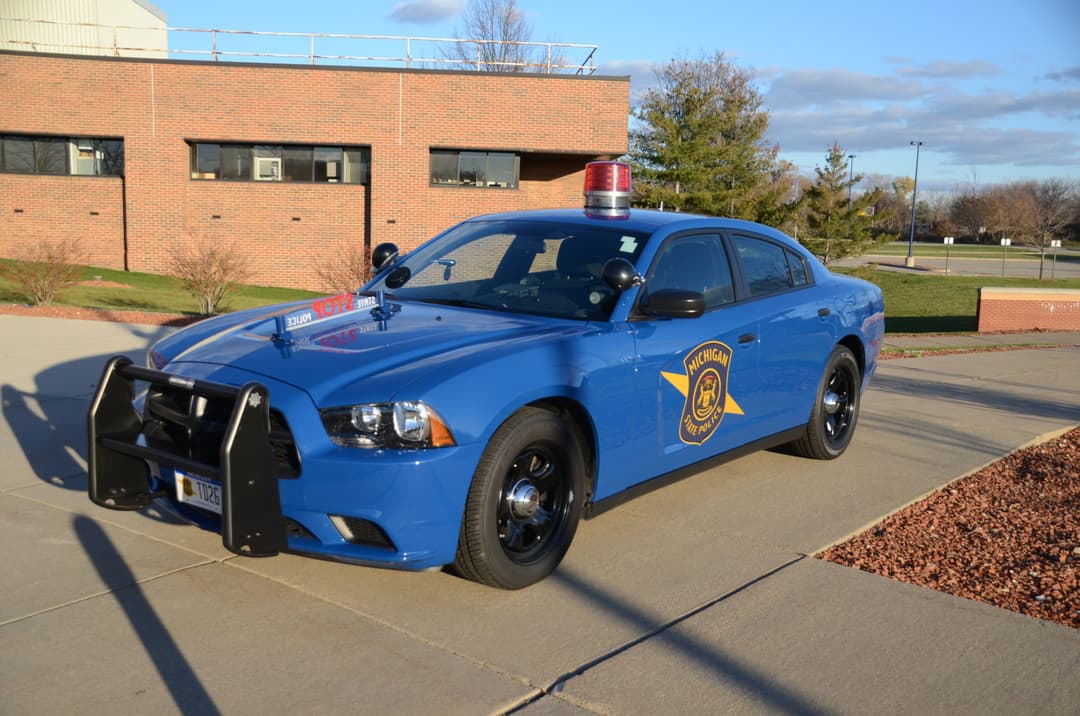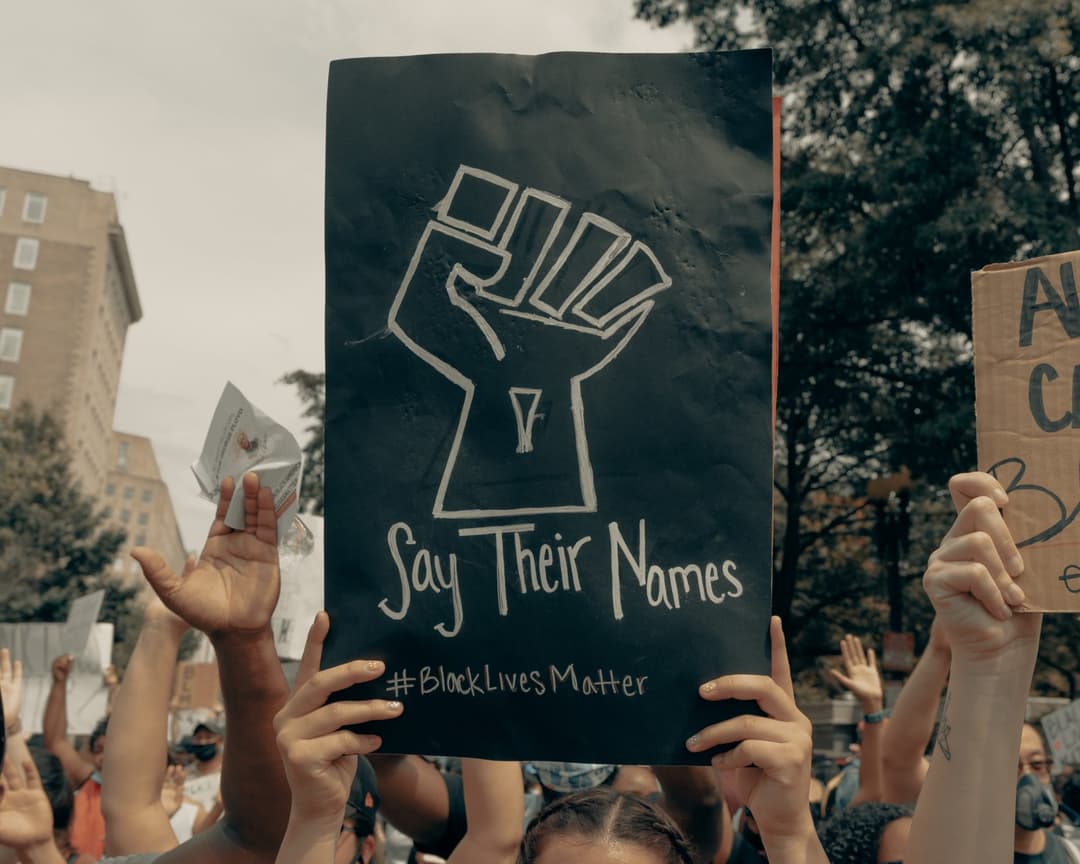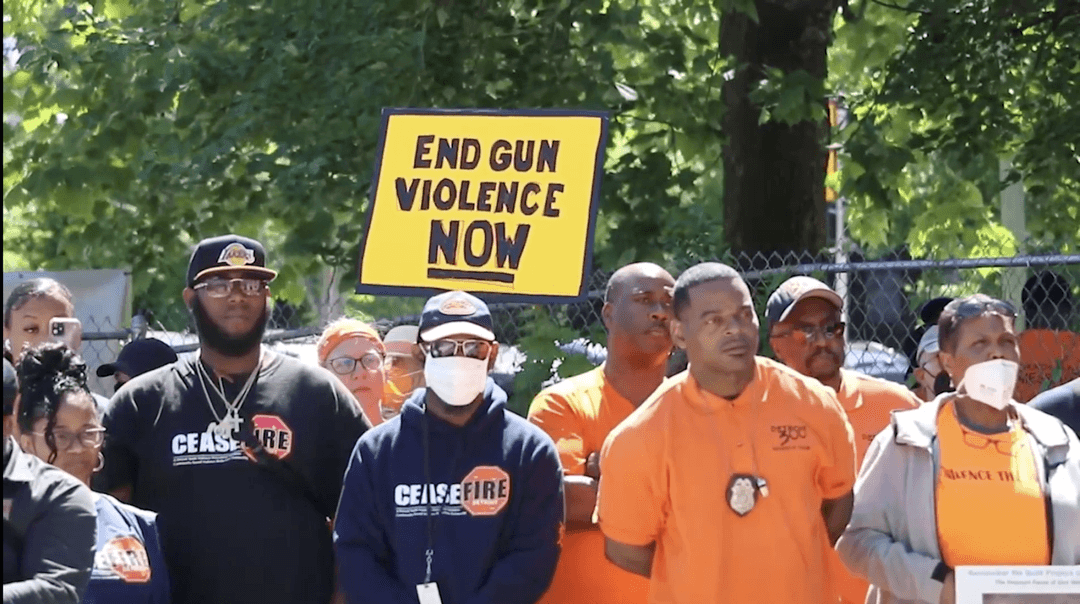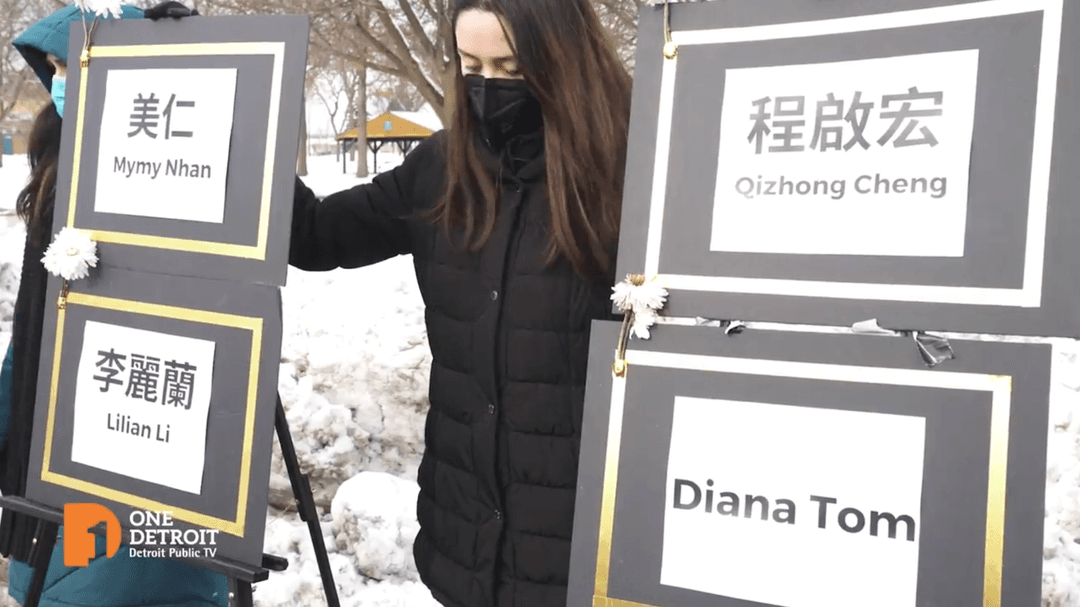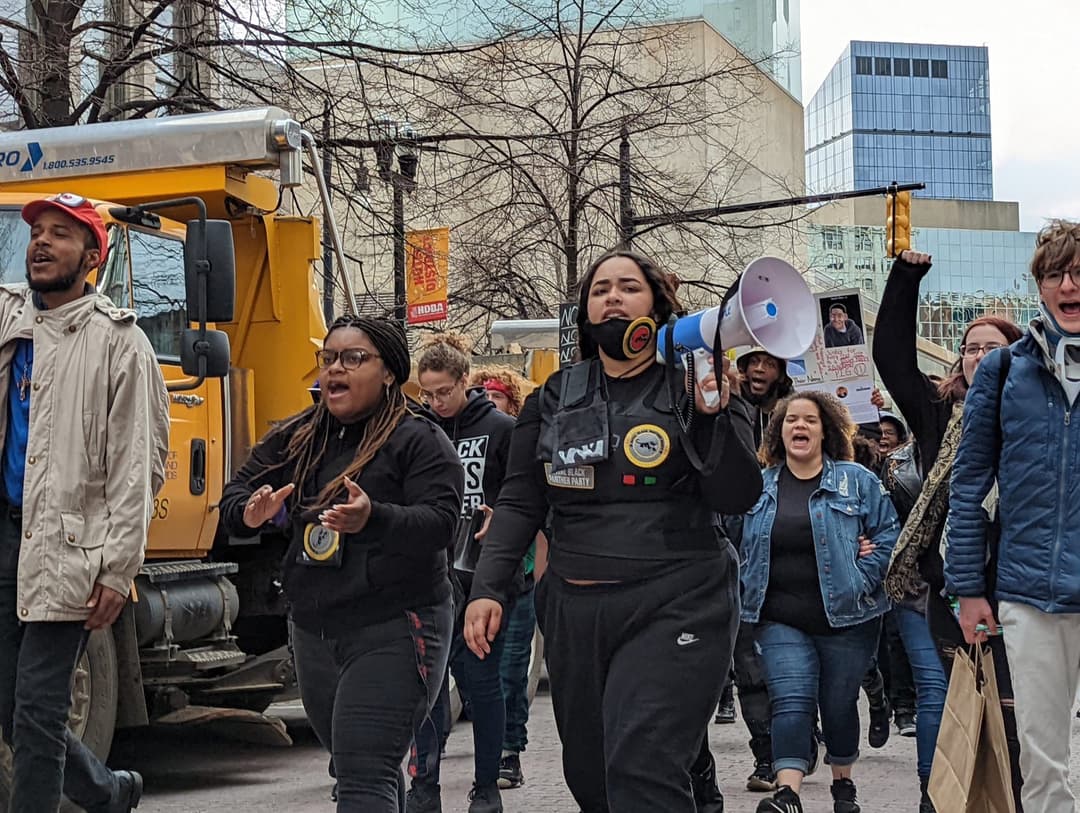Patrick Lyoya and police reform: A roundtable with the NAACP and Black Lives Matter Detroit
May 5, 2022
What have the weeks after 26-year-old African immigrant Patrick Lyoya was fatally shot by a white Grand Rapids police officer looked like for Grand Rapids? How has the community reacted and been impacted by another Black person dying after an interaction with police turned violent?
RELATED: BridgeDetroit | Grand Rapids Police Release Video On Deadly Shooting of Patrick Lyoya
Host Stephen Henderson sits down with the Greater Grand Rapids NAACP President Cle Jackson and John Sloan III, co-founder of Black Lives Matter Detroit, to discuss the impact of the tragic incident on the Grand Rapids community. Plus, they take a critical look at police relations with people of color, police reform and race relations and racial disparities in West Michigan.

Full Transcript:
Stephen Henderson: I’m going to start with you. Give us a sense of the way this feels, I guess, in the African-American community in Grand Rapids right now. We are still waiting to know much more about the consequences of what happened. But what did happen, I think not only shocks that community, but also reminds us of such a long narrative of tension between the police department there and African-Americans.
Cle Jackson, President, NAACP of Greater Grand Rapids: Yeah. Well, again, thank you for having me today to discuss this very egregious situation and horrific situation for the Lyoya family here in West Michigan. The community is, of course, outraged, right. The emotions are very high here. And there, they have been and I should say we have been, I think, patiently waiting for some answers.
Cle Jackson: As you might know, the Michigan State Police is the lead investigatory agency right now for this. We have not received an update from there in terms of where they are currently with releasing the findings of their investigation. So we’re waiting for that still. We’ve asked in terms of the NAACP of Greater Grand Rapids has asked publicly and officially, yesterday, we held a press conference at the county prosecutor’s office to which is Chris Becker, to recuse himself from this case.
We also have will be meeting with the attorney general Dana Nessel I believe next week to ask her to come in and take full control and oversight of the investigation. So we’ll see where that gets us. Chris Becker, the county prosecutor, put a statement out, an official statement yesterday indicating that he will not recuse himself from this case. And so we’re continuing to move forward, continuing to keep Patrick’s name in the spotlight, continuing to support his family as best as we can.
And so we’ll see. And as you said, you know, this is a situation that we have been in America, have been dealing with for years and years and years and years. And it has to stop at some point. It really has to stop. We have to stop automatically being criminalized by local law enforcement agents across this country. We have to stop being demonized by white America. And things have to change and they have to change quickly. And that’s what we’re expecting for in this situation.
Stephen Henderson: I wonder if you can talk about for, you know, our viewers here in Detroit, I guess the differences between what it’s like to be African-American in a place like Grand Rapids in Michigan, a smaller city with a smaller African-American population, then in some place like Detroit, where, of course, we are the overwhelming majority.
Cle Jackson: Well, I think there’s a big difference, as you guys know, this is West Michigan. You know, a lot of folks, they use this term here. We play West Michigan. Nice, right. So what that means is that the draping on the window are often not opened and so what happened during the pandemic, during the COVID 19 pandemic, back in 2020, all of the curtains were pulled off the window. Right. And honestly, even the windows were broken down and busted, I’ll just say that.
And what happened with that is it showed the gross disparity that exists here in West Michigan, not even from just the criminal justice lens, but also from a health care lens, from an economic lens, from education plans, from a youth engagement and involvement lens. And so the list goes on and on and on. West Michigan is ultra-conservative. It is rooted in the faith of the Christian Reformed Church. And in our numbers here, we probably have in the city of Grand Rapids or actually the county, I believe about 60,000 black folks here out of almost 200,000.
I think that was the last census. We were up near the 200 mark. And so that’s what we’re dealing with here. It’s has been a lot of historically a lot of managerial racism here as well. And so it has been intentional. It has been blatant, and it is in a lot of people here. I believe in mind, you know, this is not a criticism, it’s just an observation. Have perpetrated this system of white oppression and I’ll say oppression, repression, depression, every oppression you can think of. And it’s been very intentional here. And so that’s what we’re dealing with in West Michigan.
Stephen Henderson: Yeah. So, John, you and I have, of course, talked about this before and not one time, but many times it happens over and over. What I want to talk to you about, though, is something that you said to me a few years ago about the next step for African-Americans in this whole narrative of the relationship with the police. And you talked about that, it wasn’t time to wait for the police to change themselves.
Stephen Henderson: It’s not time anymore to wait for someone else to change the police. But then African-Americans and other people who have really tense relationships with police officers, we’re going to start essentially stop engaging with police, pulling away from that form of assistance or interaction in our communities. I want to start there with you.
Stephen Henderson: You know, you watch this video of this officer interacting with Patrick Lyoya. And you say over and over again, why are they interacting in the first place? And why does it turn so violent so quickly? And the answer to both of those really ultimately is that the interaction itself is the problem. And that not interacting is in so many cases now, it’s just the way that African-Americans can avoid what happened to Patrick Lyoya.
John Sloan III, Co-Founder, Black Lives Matter Detroit: Yeah. Thank you, Stephen, for having me. I always enjoy talking to you, but unfortunately, I feel like we talk too often under these circumstances. I think what we saw with Patrick’s murder and I want to I’m always going to be clear about calling it a murder and not a death or killing. Right. Because that was intentional homicide was there were so many opportunities for de-escalation. There were so many opportunities for that situation to go differently.
John Sloan III: And so every time I hear somebody say, well, we just need to reform the police, if we give them more training in de-escalation then they’ll be able to better handle situations like this. This is one clear example about how that training doesn’t work. Right. And so when we talked one of the times that we spoke during the summer of 2020, we were seeing protests all across Detroit, all across the state, all across the country.
John Sloan III: One of the things that we talked about and that I hoped would happen and did to a large extent, was that those protests created pressure on officials. They allowed us to leverage that pressure into political engagement. The problem is that there is such force, and when I say force, I mean political will, but also money, dollars behind the opposition to those things. I’m going to point very clearly to proposal P as an example. So you saw the process for Proposal P and the remaking of the Detroit City Charter start years earlier. Right.
John Sloan III: As something that is part of how our system is supposed to work. We as the residents of the city are supposed to have an opportunity to weigh in about how our city is being run and being governed. The aftermath of the summer of 20, George Floyd, Breonna Taylor and the numerous other names that we can’t mention. A lot of citizens, including myself and other residents of the city, got together and put forth amendments for the city charter. Right. Completely remaking the way the Board of Police Commissioners was structured. Completely separating the board of police commissioners from DPD, putting in mechanisms to give more, more teeth to how discipline could be meted out to agents of law enforcement agencies.
John Sloan III: As well as a myriad of other things. Participatory budgeting, like a lot of other things that were in there. And we saw proposal P go down, unfortunately, as drastically as it did because there was so much money that was put into the opposition. You couldn’t drive anywhere. I couldn’t watch ESPN, Monday Night Football, Hulu. Anything without seeing P is a problem.
John Sloan III: And so what we’re seeing is that as much as we as black folk might want to disengage, as much as me, as we as black folk might want to say, I’m going to step away from this problem. We can’t step away from the problem because the problem seeks us out, right? This system of policing is not broken. It’s doing exactly what it was designed to do. It’s upholding a social structure, it’s upholding a social hierarchy, and it’s criminalizing folks that those that have power want to make sure stay without. Right.
John Sloan III: So the more that we can frame this conversation less around, let’s fix a broken system, the more that we can frame this conversation less around. Well, we just need to get the police to do X, Y and Z. And the more that we can take advantage of this opportunity insofar as it’s a horrible and unfortunate event, but leveraging this moment to be able to get legislative action, sustainable change and progress through, if we can’t do that during moments like this, during moments like George Floyd’s death, and the further away we get, we’ve seen with our society, the further away in the rearview mirror this event becomes.
John Sloan III: Right, the less leverage we’re going to have on our elected officials. And the unfortunate reality is, for those of us who did not know, Patrick. For those of us that aren’t members of his family, we have the privilege of being able to put this in the rearview. They don’t. They’re going to have to live this every day for the rest of their lives, and we owe it to them then as a community to be able to stop and say, hey, hang on a second. This is we’ve continued to run up against this wall. It’s time to actually do something about it. It’s time to not just talk. It’s time to not just write legislation. It’s time to enact powerful change.
Stephen Henderson: Yeah. John, I’ve only got a minute or so left, but I do want to have you talk about, just kind of update us on these efforts around the country to create alternatives to the police, for people to go to when they do have problems. That would not have saved Patrick Lyoya’s life, of course. But again, this idea of stepping away from police in African-American communities has actually gained some steam.
John Sloan III: It has. And so we’ve seen if you look at Minneapolis, the Twin Cities, right in the aftermath of George Floyd’s death, there was a huge push to dismantle that system of policing, to build something new. The difficulty that is occurring is in the execution of that thing and not replicating the same harmful systems that have put us in this position in the first place. I’m in leadership with a local organization called the Detroit Safety Team. And part of what we focus on is the transport of justice and non-intuitive responses. Right.
John Sloan III: How do you center safety in the community? How do you make sure that the people that are on that block in that neighborhood have as much control as they have as much say into what safety looks like in their community as anybody else, with the understanding that what safety looks like in Brightmoor is going to be different than just the Chandlers? It’s going to be different than Southwest is going to be different than North End.
John Sloan III: And we all need to be able to have that type of way in where we’re always going to run into difficulty. Is this idea that it’s easier to just accept what we know now and just deal with it than it is to make something new. And so whenever somebody says we defund the police means to tear things down and make us unsafe. I say no it doesn’t. It means to divest from a system that has proven to kill us, that’s proven to criminalize us and invest in systems that we know work.
John Sloan III: None of these things are brand new. Right. Like we historically have seen this type of self-governance, this type of self-understanding of what safety can look like, be productive and be successful. We need the willpower as a community, and we need the willpower to put pressure on those people that have that type of legislative power and monetary control to be able to create that change.
John Sloan III: One of the first key things we can do whenever somebody sees participatory budgeting coming up on their ballot, that’s one of the first things that we can do that could really make a stand because that’s our immediate way as residents of us saying we have a right. We’re paying taxes into the city and this community. We should be able to have a say as to how that money gets spent.
Stay Connected:
Subscribe to Detroit PBS YouTube Channel & Don’t miss American Black Journal on Tuesday at 7:30 p.m and Sunday at 9:30 a.m. on Detroit PBS, WTVS-Channel 56.
Catch the daily conversations on our website, Facebook, Twitter and Instagram @amblackjournal.
View Past Episodes >
Watch American Black Journal on Tuesday at 7:30 p.m. and Sunday at 9:30 a.m. on Detroit Public TV, WTVS-Channel 56.
Stay Connected
Subscribe to Detroit PBS YouTube Channel & Don’t miss American Black Journal on Tuesday at 7:30 p.m. and Sunday at 9:30 a.m. on Detroit PBS, WTVS-Channel 56.
Catch the daily conversations on our website, Facebook, Twitter, and Instagram @amblackjournal.
Related Posts
Leave a Reply
Your email address will not be published. Required fields are marked*





